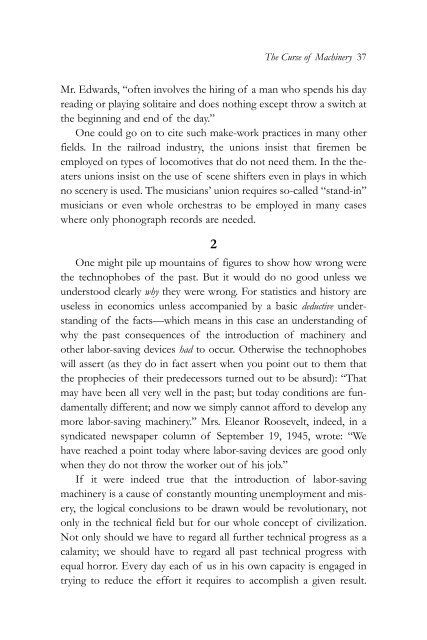1gDdM7w
1gDdM7w
1gDdM7w
- No tags were found...
Create successful ePaper yourself
Turn your PDF publications into a flip-book with our unique Google optimized e-Paper software.
The Curse of Machinery 37Mr. Edwards, “often involves the hiring of a man who spends his dayreading or playing solitaire and does nothing except throw a switch atthe beginning and end of the day.”One could go on to cite such make-work practices in many otherfields. In the railroad industry, the unions insist that firemen beemployed on types of locomotives that do not need them. In the theatersunions insist on the use of scene shifters even in plays in whichno scenery is used. The musicians’ union requires so-called “stand-in”musicians or even whole orchestras to be employed in many caseswhere only phonograph records are needed.2One might pile up mountains of figures to show how wrong werethe technophobes of the past. But it would do no good unless weunderstood clearly why they were wrong. For statistics and history areuseless in economics unless accompanied by a basic deductive understandingof the facts—which means in this case an understanding ofwhy the past consequences of the introduction of machinery andother labor-saving devices had to occur. Otherwise the technophobeswill assert (as they do in fact assert when you point out to them thatthe prophecies of their predecessors turned out to be absurd): “Thatmay have been all very well in the past; but today conditions are fundamentallydifferent; and now we simply cannot afford to develop anymore labor-saving machinery.” Mrs. Eleanor Roosevelt, indeed, in asyndicated newspaper column of September 19, 1945, wrote: “Wehave reached a point today where labor-saving devices are good onlywhen they do not throw the worker out of his job.”If it were indeed true that the introduction of labor-savingmachinery is a cause of constantly mounting unemployment and misery,the logical conclusions to be drawn would be revolutionary, notonly in the technical field but for our whole concept of civilization.Not only should we have to regard all further technical progress as acalamity; we should have to regard all past technical progress withequal horror. Every day each of us in his own capacity is engaged intrying to reduce the effort it requires to accomplish a given result.


